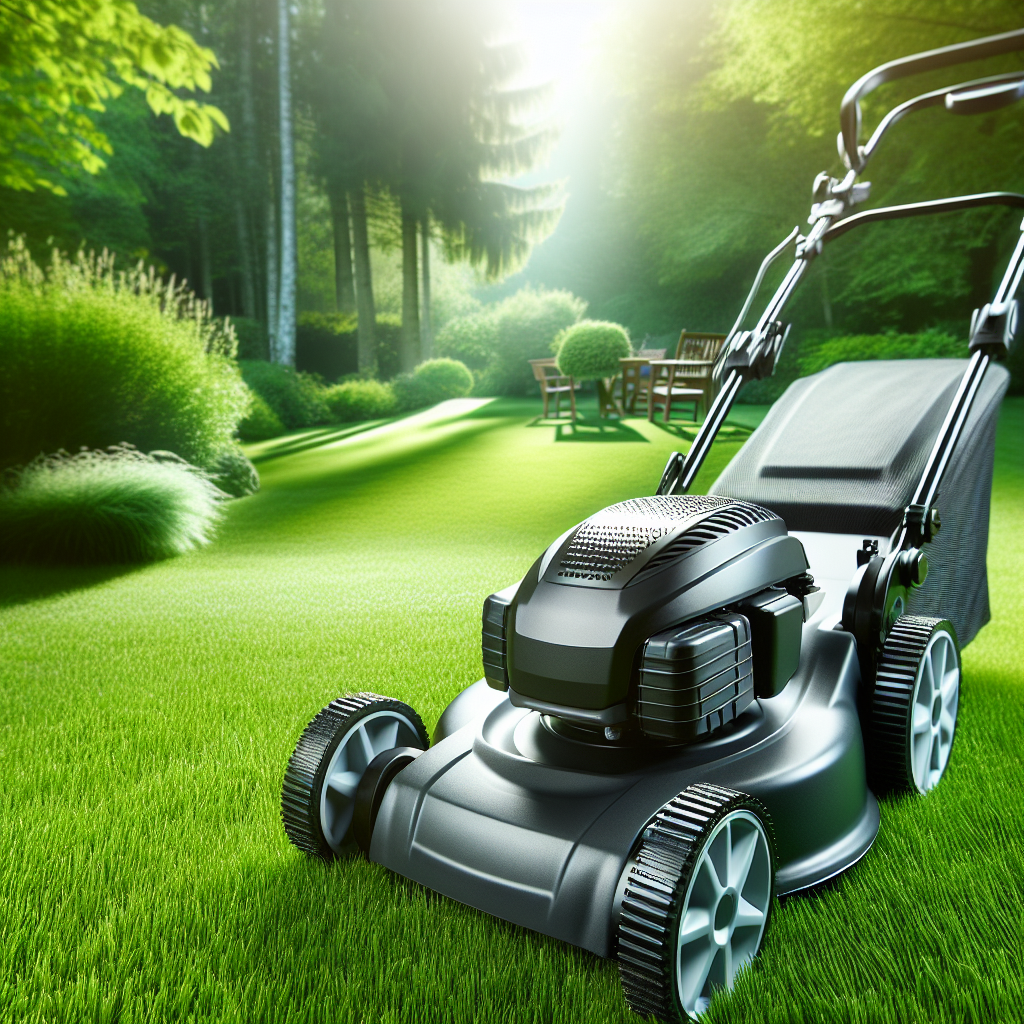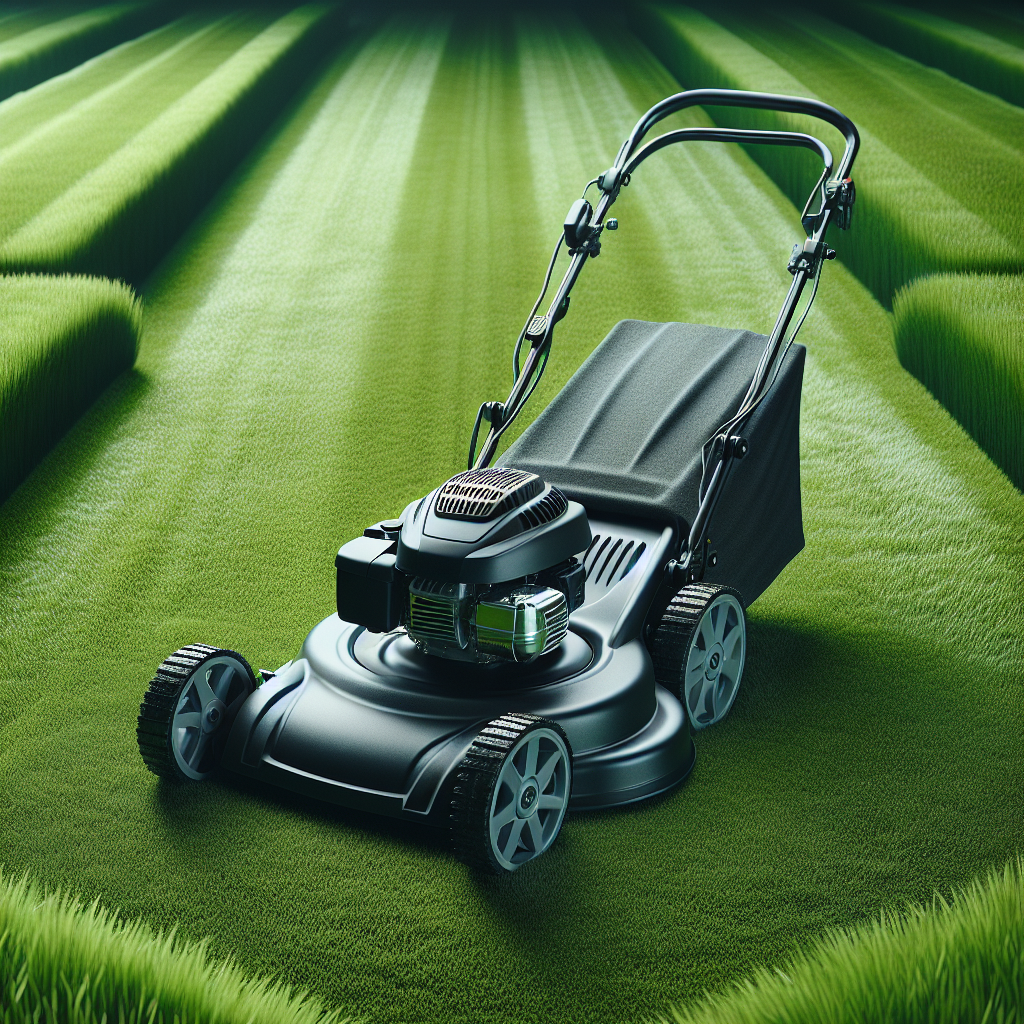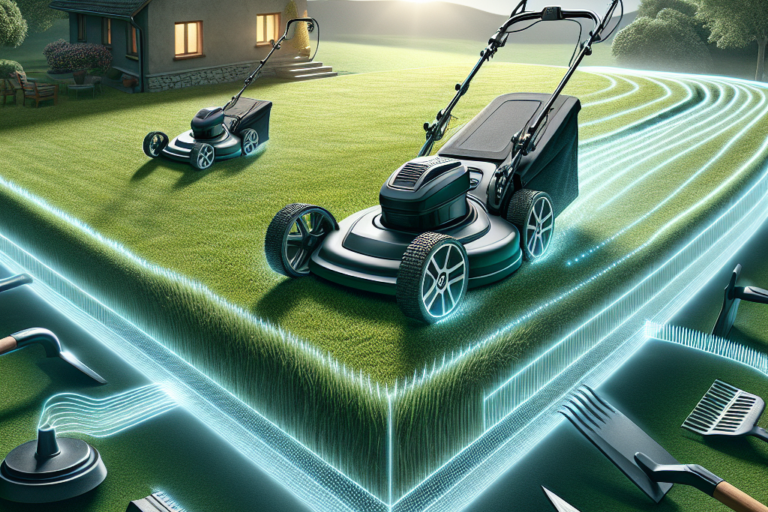Have you ever wondered about the energy efficiency of electric lawn mowers compared to their gas-powered counterparts? Well, look no further! In this article, we will explore the differences in energy consumption between these two types of lawn mowers. Whether you’re an eco-conscious individual or simply trying to save on your energy bills, understanding the efficiency of these machines can help you make an informed decision for your lawn care needs. So, let’s get straight to it and discover the energy efficiency of electric lawn mowers versus gas mowers.

Environmental Impact
Emissions
When it comes to environmental impact, one of the key factors to consider is emissions. Electric lawn mowers are certainly the greener option in this regard. Unlike gas mowers, electric mowers do not produce any direct emissions during operation. They run on electricity, which means they do not release harmful pollutants such as carbon monoxide, nitrogen oxide, or hydrocarbons into the atmosphere. By choosing an electric mower, you can significantly reduce your carbon footprint and contribute to cleaner air quality.
Noise Pollution
Another aspect of environmental impact to consider is noise pollution. Gas mowers are notorious for their loud and bothersome noise levels, which can disturb not only you but also your neighbors. On the other hand, electric mowers operate relatively quietly, creating a more peaceful environment for both you and the people around you. This is especially beneficial if you live in a residential area where noise regulations are in place. With an electric mower, you can enjoy the serenity of mowing your lawn without creating excessive noise.
Cost
Initial Investment
When it comes to costs, it’s important to weigh the initial investment required for purchasing a lawn mower. Electric mowers generally have a higher upfront cost compared to gas mowers. The technology used in electric mowers is often more advanced, and that reflects in the price tag. However, it’s essential to consider the long-term benefits that electric mowers offer, such as lower operating costs and potentially lower maintenance expenses. While the initial investment may be higher, it can often be offset by the savings you’ll experience in other areas.
Operating Costs
While the initial investment may be higher for electric mowers, their operating costs are typically lower than that of gas mowers. Electric mowers run on electricity, which is generally cheaper than gasoline. The cost of fueling a gas mower can add up over time, especially if you have a large lawn to maintain. With an electric mower, you’ll benefit from lower energy costs, making it more cost-effective to operate in the long run. Additionally, electric mowers require fewer parts and have less complex maintenance needs, which can lead to further savings on operating costs.
Maintenance Expenses
In terms of maintenance expenses, electric mowers often have an advantage over gas mowers. Gas mowers require regular oil changes, spark plug replacements, and air filter cleanings, which can add up in terms of time and money. With electric mowers, the maintenance needs are generally simpler and less frequent. You may need to sharpen the blades periodically and keep the mower clean, but you can generally avoid the additional maintenance tasks associated with gas mowers. This can save you both time and money in the long run.
Performance
Cutting Power
When it comes to performance, cutting power is a crucial aspect to consider. Gas mowers have traditionally been known for their robust cutting power, making them suitable for tackling tough and overgrown lawns. However, electric mowers have come a long way in terms of cutting power, and many models are now capable of providing comparable results. Modern electric mowers often feature high-performance motors and sharp blades that can handle most grass types and thicknesses. While gas mowers may still have a slight edge in cutting power, electric mowers have made significant advancements in this area.
Ease of Use
Ease of use is another important factor to consider when evaluating the performance of a lawn mower. Electric mowers generally have a user-friendly design and are easier to operate compared to gas mowers. They are typically lighter in weight, making them easier to maneuver, especially in tight spaces or on uneven terrain. Electric mowers also start with the push of a button, eliminating the need for pulling a starter cord repeatedly. This convenience factor can make mowing your lawn a more enjoyable and effortless task.
Runtime
One aspect where gas mowers have traditionally outperformed electric mowers is runtime. Gas mowers can run for a longer duration without needing to be recharged or refueled, making them suitable for larger properties or longer mowing sessions. However, advancements in battery technology have greatly improved the runtime of electric mowers. Many electric mowers now offer extended battery life and the option to have spare batteries for uninterrupted mowing. While electric mowers may still have limitations compared to gas mowers in terms of runtime, they have made significant progress in this aspect.
Convenience
Corded vs Cordless
When it comes to convenience, the choice between corded or cordless electric mowers is an important consideration. Corded electric mowers require a nearby power outlet to operate, which may limit your mowing range and require the use of extension cords. While corded mowers eliminate the need for recharging, they can be less convenient in terms of mobility and maneuverability. On the other hand, cordless electric mowers offer the freedom to mow without being tethered to a power source. They provide more flexibility in terms of movement but may have limitations in terms of battery life and charging time.
Refueling
One of the conveniences of electric mowers is the ease of refueling. With gas mowers, refueling requires a trip to the gas station, handling gasoline, and the potential for spills or fumes. Electric mowers, on the other hand, only require plugging the mower into a power source to recharge the battery. This eliminates the need for handling gasoline, reduces the risk of fuel spills, and saves you time and effort. Refueling an electric mower is as simple as plugging it in, making it a convenient option for those who value ease of use and simplicity.
Start-up Time
Start-up time is another factor that contributes to the overall convenience of a lawn mower. Gas mowers usually require several pulls of a starter cord to get them running, which can be a hassle, especially if the mower has been sitting idle for a while. Electric mowers, on the other hand, start instantly with the push of a button. This eliminates the need for strenuous pulling and reduces the time and effort required to start the mower. With an electric mower, you can get your mowing tasks started quickly and effortlessly, saving you time and frustration.

Safety
Risk of Fuel Ignition
When it comes to safety, one of the significant advantages of electric mowers is the absence of the risk of fuel ignition. Gas mowers run on highly flammable gasoline, and there is always a potential risk of fuel leaks or ignition from sparks or heat. This can be a concern, especially if you’re mowing in dry and hot conditions. Electric mowers, on the other hand, do not have this risk as they operate on electricity. This eliminates the worry of fuel-related fires and provides peace of mind during your mowing tasks.
Exposure to Harmful Substances
Gas mowers emit exhaust fumes that contain harmful substances, including carbon monoxide, nitrogen oxides, and volatile organic compounds. These pollutants can pose health risks when inhaled, especially in enclosed or poorly ventilated spaces. Electric mowers, being emission-free during operation, eliminate the exposure to these harmful substances. This makes them a safer option for both the operator and the environment, reducing the risk of respiratory issues and other health concerns associated with exposure to exhaust fumes.
Maintenance Hazards
Maintenance tasks can sometimes involve potential hazards, and it’s important to consider this aspect when choosing a lawn mower. Gas mowers require regular maintenance that involves handling gasoline, oil, and other potentially hazardous substances. There is a risk of spills, leaks, and accidental contact with these substances during maintenance procedures. Electric mowers, with their simpler maintenance needs, reduce the risk of exposure to harmful substances and minimize the potential hazards associated with maintenance tasks. This makes electric mowers a safer option in terms of day-to-day maintenance.
Lifespan and Durability
Motor Longevity
The lifespan and durability of a lawn mower’s motor is an essential consideration when evaluating its overall performance. Electric mowers often have an advantage in this regard. Gas mower engines are generally more complex, with more moving parts that can wear out over time. In contrast, electric mower motors have fewer moving parts, resulting in fewer potential points of failure. This can contribute to a longer motor lifespan and increased durability, reducing the need for major repairs or engine replacements. Choosing an electric mower may offer you a reliable and long-lasting motor performance.
Rust and Corrosion
Rust and corrosion can significantly impact the performance and durability of a lawn mower, especially if you live in a humid or coastal environment where moisture levels are high. Gas mowers, with their metal components and exposure to gas and oil, are more susceptible to rust and corrosion over time. Electric mowers, with their typically plastic or composite construction, are generally more resistant to rust and corrosion. This can prolong the lifespan of the mower and help maintain its performance and appearance, even in challenging environmental conditions.
Blade Maintenance
Blade maintenance is an essential aspect of keeping your lawn mower in good working condition. Both gas and electric mowers require regular blade maintenance, including sharpening and occasional replacement. However, due to the nature of gas mowers and their more demanding cutting power, their blades may require more frequent sharpening and replacement. Electric mowers, with their generally lower cutting power, may have blades that require less maintenance. This can save you time and effort when it comes to maintaining the blades of your mower, ensuring optimal cutting performance with minimal maintenance needs.
Flexibility
Terrain Adaptability
The ability of a lawn mower to adapt to different terrains is crucial for achieving a well-maintained lawn. Electric mowers can be just as versatile as gas mowers in this regard. They are designed to handle various terrains, including slopes, uneven surfaces, and tight corners. Many electric mowers feature adjustable cutting heights and wheels that provide excellent traction, allowing for efficient mowing on different surfaces. Whether you have a flat lawn or a hilly terrain, you can find an electric mower that meets your specific terrain adaptability needs.
Mulching and Bagging Options
When it comes to lawn care, options for mulching and bagging grass clippings are important factors to consider. Electric mowers often offer versatility in this area. Many electric mowers come with mulching attachments that finely chop grass clippings and return them to the lawn, providing natural fertilization. They also typically have bagging options, allowing you to collect the clippings and dispose of them as needed. Having the choice between mulching and bagging gives you more flexibility in tailoring your lawn care routine to your specific preferences and needs.
Attachments and Accessories
Another aspect of flexibility to consider is the availability of attachments and accessories for your lawn mower. Gas mowers typically have a wide range of compatible attachments and accessories, such as baggers, dethatchers, and aerators. However, electric mowers are also catching up in this aspect. Many electric mower manufacturers now offer compatible attachments and accessories that enhance the versatility of the mower. From edgers to trimmers to snow blowers, you can find a range of options to customize your electric mower according to your specific lawn care requirements.
Storage Concerns
Space Occupied
Storage space is an important consideration when it comes to lawn mower ownership. Gas mowers, with their larger size and the need for fuel storage, often require more spacious storage areas. Electric mowers, on the other hand, are generally more compact and easier to store. Some electric mowers even have foldable handles, further reducing the space they occupy in your storage area. If you have limited storage space or prefer a mower that takes up less room, an electric mower can provide a more convenient storage solution.
Fuel Storage
For gas mowers, storage also includes the need to store fuel. Gasoline is highly flammable, and storing it improperly can be a safety hazard. Additionally, unused gasoline can degrade over time, leading to potential engine performance issues. Electric mowers eliminate the need for fuel storage altogether. With an electric mower, you only need to ensure you have a reliable power source for recharging. This simplifies the storage process by eliminating the need to handle and store potentially hazardous substances, making electric mowers a safer and more convenient option.
Power Source Availability
Access to Electricity
The availability of a power source is an essential consideration when choosing between an electric mower and a gas mower. Electric mowers require access to electricity to recharge their batteries. If you have easy access to electrical outlets nearby, this is not a significant concern. However, if your property does not have conveniently located power outlets or has limited access to electricity, using an electric mower may be more challenging. It’s important to assess the availability and accessibility of power sources in your lawn area before deciding on an electric mower.
Availability of Gas
On the other hand, gas mowers require a ready supply of gasoline. While gas stations are readily available in most areas, there can be instances where obtaining gasoline may be more inconvenient. This is particularly true if you live in a remote area or during times of fuel shortages or emergencies. Gasoline also needs to be stored properly to avoid safety hazards. If the availability and convenience of gasoline supply are a concern for you, an electric mower may offer a more practical solution that eliminates the need for obtaining and storing fuel.
Overall Versus Specific Needs
Size of Lawn
When evaluating the overall suitability of a lawn mower, it’s important to consider the specific needs of your lawn. The size of your lawn plays a significant role in determining whether an electric or gas mower is more appropriate. Electric mowers are generally better suited for smaller to medium-sized lawns due to their runtime limitations. If you have a large lawn, a gas mower may provide a longer runtime and the convenience of not having to recharge the batteries. Assess the size of your lawn and the runtime requirements to choose a mower that can efficiently handle your mowing needs.
Personal Preferences
Finally, personal preferences should also factor into your decision-making process. Consider what features and benefits are most important to you. Do you prioritize environmental friendliness, ease of use, or noise level? Are you comfortable with the maintenance needs of a gas mower, or do you prefer the simplicity of an electric mower? Understanding your personal preferences and priorities will help guide you towards the mower that aligns best with your needs and ensures your lawn care experience is as enjoyable and convenient as possible.
In conclusion, when comparing electric and gas lawn mowers, there are several factors to consider. Electric mowers have a positive environmental impact, producing zero emissions and reducing noise pollution. While they may have a higher initial investment, their lower operating costs and maintenance expenses can offset this. In terms of performance, electric mowers have made significant advancements in cutting power and are easy to use. While they may have limitations in terms of runtime, they offer the convenience of cordless operation and quick start-up. Electric mowers are also safer, with no risk of fuel ignition or exposure to harmful substances during maintenance. They tend to have longer motor longevity, better resistance to rust and corrosion, and simpler blade maintenance. Electric mowers are flexible, adapting to different terrains and offering mulching and bagging options. Storage concerns are minimized with their compact size and no need for fuel storage. Power source availability plays a role, with electric mowers requiring access to electricity and gas mowers relying on the availability of gasoline. Ultimately, your choice between electric and gas mowers should be based on your specific needs, the size of your lawn, and your personal preferences.






